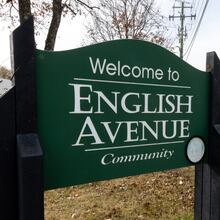Georgia’s unemployment rate dropped last month to the lowest level since September 2008, but that’s little solace to Bryan Woodward. He has been jobless since moving from Alaska to Lithonia a year ago.
Woodward, 49, is in what should be his prime earning years when the biggest paychecks of a career are supposed to pad a comfortable retirement. Instead, he spends his days looking for work — a cashier’s job at half his previous salary is acceptable — and retirement is nowhere on the radar.
“My wife and I were considering some place warm like New Mexico or Carolina or Mississippi possibly, or maybe sticking around here in Georgia for retirement,” Woodward said. “But as time goes on, it’s getting harder to envision even retiring, let alone where we’re going to retire.”
Woodward is part of a segment of the workforce — the mid-career unemployed — not being helped much by the falling jobless rate. One of every four Georgians between the ages of 35 and 54 is not working, according to statistics provided to the Atlanta Journal-Constitution by the Bureau of Labor Statistics.
A decade ago, it was one in five. The Great Recession — deepened here by Georgia’s over-reliance on housing and construction — slammed middle-aged workers who once made decent salaries in the run-up to a comfortable retirement of golf and grandchildren.
“These people not in the workforce now are not earning money which means they can’t buy things and, therefore, there’s less money for the economy,” said Michael Wald, a former economist with the U.S. Department of Labor. “And the older you are, the less time you have to make up for any earnings deficits.
“That means you’re looking towards a poor retirement because you missed your highest earning years.”
Georgia added 27,400 jobs last month, the state labor department reported Thursday, the most February-to-March job growth in a decade. With fewer layoffs too, the unemployment rate dipped from 7.1 percent in February to 7 percent in March.
Most new jobs came in the hospitality, business services, transportation and warehouse industries. It will take much more robust job growth, though, to get the 334,553 Georgians officially counted as unemployed back to work. The unemployment rate doesn’t include people who’ve given up the job search, gone back to school or taken early retirement.
Woodward managed a car wash in Alaska, as well as safety for a regional airline. He discovered a slew of job leads in Atlanta since arriving last May, after his wife got a job at a federal agency here. But what he thought was a management position at an airport restaurant turned out to be a biscuit-making job at $8.50 an hour. A cashier’s job at Sam’s Club fizzled when the assistant manager learned of Woodward’s over-qualifications, he believes.
“I don’t get a lot of call backs or interviews,” he said. “It’s either my age or they’re looking for somebody more experienced. Or they’re looking for somebody younger and cheaper.”
In a good economy, the mid-career jobless can often move up to better, higher-paying jobs. But older workers, seared by the recession’s impact on pensions and 401(k)s, are holding on to jobs longer and prolonging retirement.
In 2002, for example, 14 percent of people older than 55 worked, according to the BLS. By 2012 it was 21 percent did.
“It’s kind of unfair because I’m still fairly young and I would like to work,” said Samantha Wiley, 40, an ex-park ranger from Villa Rica unemployed five years. “But I totally get where (older workers staying in jobs) are coming from. They’re at the point where they should be able to retire and go and do fun things, but they can’t. It’s unfair to both of us.”
Wiley moved home with her parents. She cleans out stalls in exchange for free boarding for her horse, Charmer. She applied for food stamps three years ago, but didn’t qualify.
Mid-career workers don’t just plump jobless rolls. They also, in growing portions, avail themselves of food stamps, Medicaid and other social service programs.
In 1989, for example, 3 percent of men between 25 and 64 collected federal disability benefits, according to the Social Security Administration. Last year, 5.5 percent did — and half were 54 or younger.
“When people stop working at an early age it creates a greater dependency on society and public services that’s not good for them and has a spill-over effect for the rest of us,” said Carl Van Horn, director of the Heldrich Center for Workforce Development at Rutgers University. “And they may be out of the workforce permanently.”
Research by Melinda Pitts, an economist at the Federal Reserve Bank of Atlanta, concludes that the rise in middle-aged joblessness, post-recession, is caused mostly by men and women who don’t want a job as opposed to those who can’t find one. In some cases a spouse still works, enabling them to get by.
“Some say, ‘I want a job in the field I’m trained in and I’m holding out for that,” said Pitts, who runs the Fed’s Center for Human Capital Studies. “Otherwise I’m better off going back to school or staying at home with my kids. For some, making minimum wage won’t cover child care so there’s no real incentive to work. There are trade-offs.”
Villa Rica’s Wiley doesn’t have the luxury of choice.
“I’ve got nothing,” she said. “I don’t have any sort of retirement plan. Until I can find a decent-paying job and can start putting some money aside, I don’t get to retire until the day I die.”
About the Author





